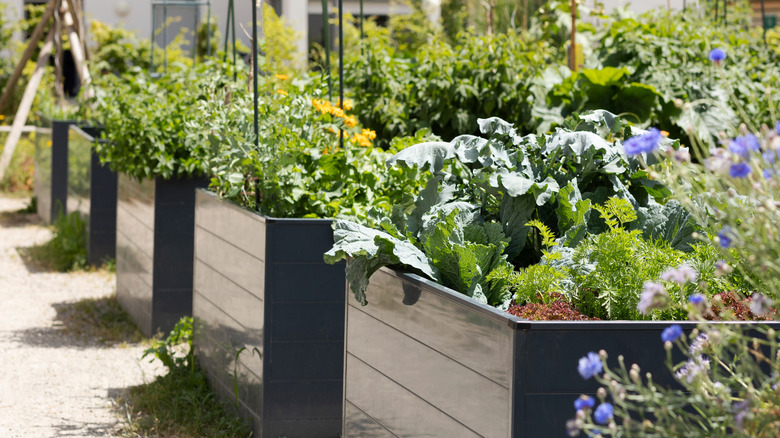The Most Budget-Friendly Supply For Making DIY Raised Garden Beds
Whether you're working with limited space, have mobility issues, or simply want to improve the quality of your crops – raised garden beds are a great solution. These beds are highly customizable and can be crafted on a tight budget if you know which materials to use. There are several common materials you can use for DIY raised garden beds, but decking boards are one of the most affordable options on the market, especially if you have materials left over from your latest deck renovation. After all, why pay for new materials when the cost of renovating a deck has already been covered?
Even when buying new, pressure-treated wood decking boards run as low as $2 per square foot. Outside of the low cost, these treated decking boards are easy to work with, easy to customize, and stand up to the elements. If you're concerned about the safety of treated wood and fear toxins that could leak into your garden, there is good news. Newer types of treated deck boards available to consumers utilize preservatives such as alkaline copper quatenary and copper azole, which are safer to use than outdated treated wood that often used chromated arsenicals.
Deck boards compared to other materials
Of course, you're not limited to pressure-treated wood. Composite decking boards are a great choice for anyone interested in a low-maintenance alternative. Although composite decking costs more upfront, it boasts a longer lifespan and far less maintenance than wood boards require. Additionally, composite boards are an eco-friendly option. For example, Trex — a popular composite decking and railing manufacturer — uses 95% recycled plastic and wood chips to make their boards.
Natural materials, such as bricks, also make for visually appealing garden beds, though they come with a steeper price tag than deck boards – nearly $3 per square foot or more. Bricks are commonly sold by the thousand, so getting the exact amount needed could prove tricky and you'd likely pay for far more than you need. Metal is another alternative, but again, it comes with a higher price tag. Additionally, metal absorbs and holds heat extremely well, which may prove to be an issue for growing plants inside it if you live in a warmer climate.
When compared to bricks and metal, deck boards made from either pressure-treated wood or composite offer the most attractive price tag and a slew of undeniable benefits. Once your project is built, you'll require additional supplies such as plastic lining, soil, and of course, plants that are perfect for a raised garden bed.

